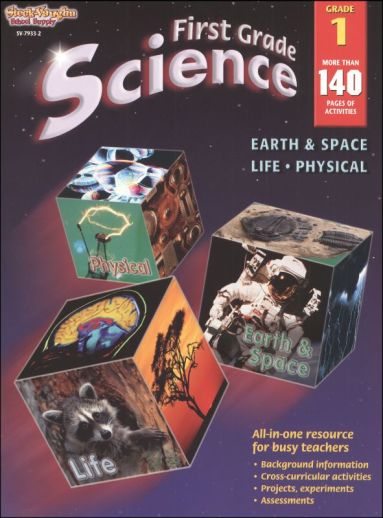We use cookies to make your experience better. To comply with the new e-Privacy directive, we need to ask for your consent to set the cookies. Learn more.
Science Grade 1
Since when did "workbooks" come to denote pages and pages of pencil-and-paper activities, Id like to know? To me, the word sounds more like it should be defined as a "book of work," and if this series doesnt qualify as that, then I dont know what should. This excellent and well-rounded science series contains almost everything youd need in an elementary science curriculum.
Each book covers the three main branches of science - earth/space, life, and physicalEach of the three units kicks off with several pages of text where important concepts are defined and explained, followed by a list of suggested reading on those topics. Each topic or concept within each unit is represented by several workbook pages related to that topic, in which a short piece of text is given, followed by either a hands-on experiment or a pencil-and-paper activity consisting primarily of thinking questions. Overall, the hands-on experimentation and the worksheet activities are pretty evenly matched - also impressive for a mere workbook.
Well organized science experimentsI really like the layout of the experiments as well, with a brief overview, a list of necessary materials (primarily around-the-house objects), step-by-step directions, any necessary charts to be filled in after student observations and several questions designed to get the student thinking about what he saw in the activity and why.
Im also impressed at the depth the topics are presented in here. Overall, this is a terrific science framework thats a little less than a textual-based program, but more than just a workbook. It could be easily fleshed out to a full program with the inclusion of the suggested reading within, to use as an extension with a science text for that grade level, or to supplement an elementary unit study that needs a little more "serious" science. A full answer key as well as unit and course assessments are included. These well-designed and complete workbooks definitely get my science stamp of approval! - Jess
| Product Format: | Softcover Book |
|---|---|
| Grade: | 1 |
| Brand: | Steck-Vaughn |
| ISBN: | 9780739879337 |
| Length in Inches: | 11 |
| Width in Inches: | 8.5 |
| Height in Inches: | 0.25 |
| Weight in Pounds: | 0.75 |


Recommended
Looking for an introductory science program that isn't too rigorous, or too basic. Hopefully this is what we're looking for.
Ease of use.
Seemed like a good interactive book that would interest my child